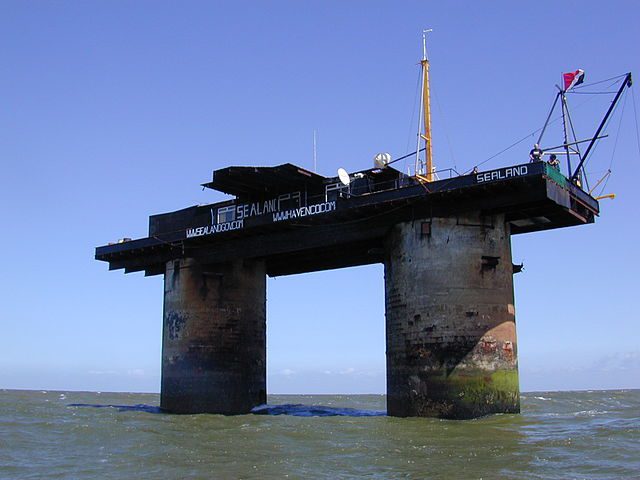Amish on Vacation, the Unreal Art Market, and the World’s Smallest Nation

It’s not surprising that the Amish take vacation. Everyone does (or should). But I was surprised to learn this morning that many of them travel to a small neighborhood in Sarasota, Florida for a little R&R and have been doing so for nearly a century: ‘‘We don’t associate the Amish with leisure,’ says photographer Dina Litovsky . . . Litovsky has made several trips to Pinecraft, where she observes the vacationers ‘in community together’—not just worshipping, but taking meals in the area’s growing number of restaurants; enjoying concerts and benefit events in the park; saltwater fishing; and playing shuffleboard, chess, marbles, even a nighttime-game of volleyball. ‘It’s like a metropolis,’ she says. ‘It’s their New York City.’’
The questions regarding the authenticity of Salvator Mundi, which were ignored by major commercial and museum interests, reveal just how messy and unreal the art market has become, Federico Varese writes in The Times Literary Supplment.
Is one solution to stop selling art entirely? That was Suzi Gablik’s radical proposal in her 1984 book Has Modernism Failed? The problem with modernism, Gablik writes “is the pervasive spiritual crisis of Western civilisation: the absence of a system of beliefs that justifies any allegiance to any entity beyond the self. Insistence upon absolute freedom for each individual leads to a negative attitude towards society, which is seen as limiting to one’s projects, and ultimately constricting … There is no doubt that even freedom can become desolating, that after a while, even the artist may not know what to do with it … At the very least, it is a phenomenon with a very short history that has not been essential in the past to human survival, or to a rich human culture—and with the backfire of scrutiny, we may yet come to see that it may prove inimical to both . . . For some time now it has been evident that the critical intransigence of the avant-garde is evaporating in front of our eyes. Provocations that once seemed radical have long since lost their power to shock. Even the most difficult art has become comfortably familiar, and the unpredictable predictable.” To push back against this individualism, she suggests returning to the idea that a “work of art is a gift, not a commodity.”
But Gary Furnell is not so sure that this will address the problem: “Art may be a gift in its initial stages as the artist is gifted with a vision—an intellective flash, an intuition, an inspiration—for an artwork which he may later sell, but this does not mean that either the buyer or the artist thought of the transaction exclusively in mercenary terms. Payment reflects, in part at least, that the ‘labourer is worthy of his hire’ and the exchange of money recognises that to have the time to complete his art an artist is entitled to a livelihood. A distortion occurred, as Hughes observed, when artists whose inadequate training denied them excellence in the traditional skills of drawing, sculpting and painting had their over-rated work promoted and sold at inflated prices by ‘celebrity’ gallery owners to undiscerning buyers.”
Treatments for Ebola discovered: “Two treatments have been found to reliably help patients resist the deadly virus—just nine months after a clinical trial began.”
Tara Cheesman reviews Anthony Horowitz latest book: “The Sentence Is Death is the second installment of his latest series, Hawthorne Investigates (which is not actually the series name but, as a maybe fictional version of Steven Spielberg notes in the first book, it should be). The premise, introduced in The Word Is Murder, is both familiar and tantalizingly original. Anthony Horowitz — the book’s actual author and fictional narrator — is approached by a one-time police consultant on his BBC series Injustice (which aired five episodes in 2011) with an unusual proposition.”
There have always been literary scammers. Alexander Jessup was one of the worst.
Essay of the Day:
In The Atlantic, Ian Urbina writes about his visit to the world’s smallest nation—Sealand:
“The improbable creation story of the world’s tiniest maritime nation was a thumb in the eye of international law.
“Constituted as a principality, Sealand had its own passport, coat of arms, and flag—red and black, with a white diagonal stripe. Its currency was the Sealand dollar, bearing Joan’s image. In more recent years, it has launched a Facebook page, a Twitter account, and a YouTube channel.
“Though no country formally recognizes Sealand, its sovereignty has been hard to deny. Half a dozen times, the British government and assorted other groups, backed by mercenaries, have tried and failed to take over the platform by force. In virtually every instance, the Bates family scared them off by firing rifles in their direction, tossing gasoline bombs, dropping cinder blocks onto their boats, or pushing their ladders into the sea. Britain once controlled a vast empire over which the sun never set, but it’s been unable to control a rogue micronation barely bigger than the main ballroom in Buckingham Palace.
“The reason goes back to the first principles of sovereignty: A country’s ability to enforce its laws extends only as far as its borders. In May 1968, Roy’s son, Michael, fired a .22-caliber pistol at workers servicing a buoy nearby. Michael claimed that they were mere warning shots to remind these workers of Sealand’s territorial sovereignty. No one was hurt in the incident, but the consequences for Britain’s legal system—and Sealand’s geopolitical status—were far-reaching.
“The British government soon brought firearms charges against Michael, for illegal possession and discharge. But the court subsequently ruled that his actions happened outside British territory and jurisdiction, making them unpunishable under British law. Emboldened by the ruling, Roy later told a British official that he could order a murder on Sealand if he so chose, because ‘I am the person responsible for the law in Sealand.’”
Photo: Conch island
Receive Prufrock in your inbox every weekday morning. Subscribe here.
Comments